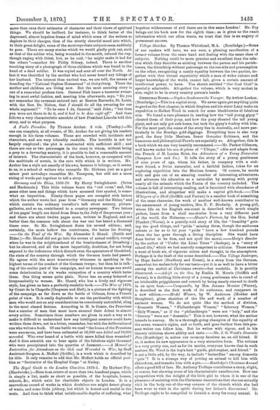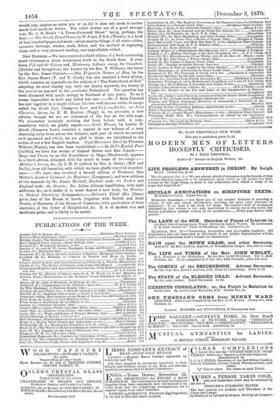CHRISTMAS Boors.—Stephen Scudamore the Younger. By Arthur Looker. (Routledge.)—This is
a capital story. We never again get anything quite so good as the first chapter, in which Stephen and his sister Lucy make an expedition to Halket Wood in search for some blackberries of fabulous size. We found a rare pleasure in reading how the " tall young gipsy " cheated them of their pony, and how the pony cheated the tall young gipsy, and not only got safe home, but took the gipsy's donkey with him. For the most part, the scene of the story lies in Australia, and more par- ticularly in the Bendigo gold-diggings. Everything hero is also very good, the fiery little Mexican, Senor Gonzalez Robinson, and the humorous and philosophical Prowle are especially so. Altogether, this is a book which we can very heartily recommend.—Mr. Parker Gillmore, well known under his non de plume of " Ubique," edits and adapts from the French of M. Lucien Briat, the Adventures of a Young Naturalist (Sampson Low and Co.) It tells the story of a young gentleman of nine years of age, whom his father, in company with a stal- wart friend, a Swiss naturalist, and a faithful Indian, takes for an exploring expedition into the Mexican forests. Of course, he meets with and gets out of an amazing number of interesting adventures, and advances his education as a naturalist by meeting with pretty nearly all the animals which the Fauna of the country included. The volume is full of interesting reading, and is furnished with abundance of illustrations, and altogether will make a capital gift-book.—The Whispers of a Shell (Griffith and Farran) is a smaller book of something of the same character, the work of another well-known contributor to the amusement of young readers, Mrs. F. F. Broderip. A young girl, whose life on the English sea-coast is described with much simple pathos, hears from a shell sea-stories from a very different part of the world, the Moluccas.—Hesler's Fortune, by the Hon. Isabel Plunket (Warne), is a prettily-told story of life, the " humility " gett- ing the good things, and "pride " missing them, though the authoress relents so far as to let poor "pride " have a few hundred pounds when she has gone through a fitting discipline. She would have done better to be firm, and not spoil the moral.—Hetry's Resolve by the author of "Under the Lime Trees " (Seeleys), is a "story of school life," which we feel scarcely competent to criticize. There seems a want of fresh air, of vigorous action and thought, in the atmosphere. Perhaps it is the fault of the scene described.—The Village Innkeeper, by Hope Inslow (Bradbury and Evans), is a story from the German, somewhat too melancholy for our taste—yet it is as well to have a bitter among the surfeit of Christmas sweets—but readable. It is prettily illustrated. —Adrift on the Sea, by Emilia M. Morris (Griffith and Farran), is a thrilling little story of a young gentleman who is cured of an intolerable priggishness and conceit by being nearly starved to death in an open boat.—Campanella, by Mrs. Jerome Mercier (Warne), is described as the first work of its authoress, and reappears in a new edition.—Model Women, by W. Anderson (Hodder and Stoughton), gives sketches of the life and work of a number of eminent women. We do not quitd like the method of division, "Domestic Women," "Philanthropic Women," "Literary Women," "Holy Women," as if the " philanthropic " were not "holy," and the "literary" were not " domestic." This is not, however, what the author intends to convey. He is a thorough-going champion of the equality of the sexes, woman's rights, and so forth, and goes further than this pre- sent writer can follow him. But he writes with vigour, and in his literary criticism shows ability and taste.—Mr. J. G. Wood's Domestic Pets (Routledge) is, unless our memory deceives us, an old friend. If so, it makes its new appearance in a very attractive form. The volume is a very pretty one, and as for its merits, everyone knows that in such matters Mr. Wood is the boy's best "guide, philosopher, and friend." Is it not a little odd, by the way, to include " butterflies " among domestic pets "? It is a strange way of petting an animal to kill him with chloroform, and transfix him with a pin.—Routledge's Christmas Annual offers a good bill of fare. Mr. Anthony Trollope contributes a story, slight, of course, but showing some of his characteristic excellencies. How one sympathizes with the delight of the little girl to whom it is one of the pleasures of assisting with the Christmas decorations that she can actually visit in the body out-of-the-way corners of the church which she had been wont to visit in the spirit during her father's discourses ! Mr. Trollops ought to be compelled to furnish a story for every annual. It
would only require an extra pen or so, for it does not seem to matter much how much he writes. The other stories are of a good average sort, Mr. C. H. Ross's "A Three-Cornered Ghost" being, perhaps, the best.—The Broad, Broad Ocean, by W. Jones, F.S.A. (Warne), is a book of four hundred pages and more—about marine things of all sorts—tides, currents, icebergs, whales, seals, fishes, and the method of capturing them, and is very pleasant reading, nor unprofitable withal.



































 Previous page
Previous page